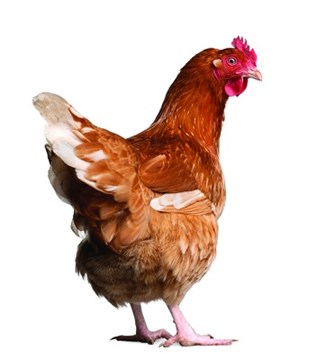Published 9/9/2015
Compassion in World Farming applauds McDonald’s move to eliminate cages for laying hens in US and Canada

McDonald’s, the nation’s leading fast food company, announced today that within 10 years they will no longer buy eggs from farmers keeping their hens in cages in the US and Canada.
McDonald’s USA President Mike Andres shared with Compassion in World Farming the following statement, “Our customers are increasingly interested in knowing more about their food and where it comes from. Our decision to source only cage-free eggs reinforces the focus we place on food quality and our menu to meet and exceed our customers’ expectations.”
“We wholeheartedly commend McDonald’s for their announcement to go cage-free with their eggs. This will positively affect the lives of over 7 million hens annually in the US and Canada and the importance cannot be overstated. McDonald’s is doing what is right for animals and what is supported by their customers. Nobody wants to see a hen locked up in a cage and McDonald’s has recognized that today,” says Leah Garces, US Director for Compassion in World Farming.
In 2012, McDonald’s made a similarly significant announcement to move away from gestation crates for pregnant pigs, where sows are kept in crates so small they cannot even turn around or lie down easily. Following their announcement, dozens of companies followed their lead.
Garces continues, “McDonald’s is a market leader, and today they have also shown they are stepping up to be leaders in animal welfare. We have no doubt their announcement will create a ripple effect in the entire market. This signals the end of the cage age for laying hens in the US.”
The decision was preceded by several years of consideration by the company. The Coalition for Sustainable Egg Supply, supported by General Mills and McDonald’s amongst others, conducted a study to understand the impacts of three laying hen housing systems – battery cage, enriched cages, and cage-free aviary. The research project was conducted over three years and two separate flocks, and the final research results were released publicly in March 2015. Compassion in World Farming published a response to the study which it shared with McDonald’s, urging the company to reject cages of any kind for hens.
General Mills and McDonald’s have now both made cage-free egg policy announcements. McDonald’s is one of the biggest purchasers of eggs in North America, buying 2 billion eggs a year in the US, and 120 million eggs a year in Canada. McDonald’s currently purchases 13 million cage-free eggs, already making them a significant player in the cage-free market. Compass, Aramark and Sodexo have also made cage-free announcements recently.i
The policy will affect eggs served on their breakfast menu, including shelled and liquid eggs. In October, McDonald’s announced it would be extending their breakfast menu to be served all day, meaning the number of eggs purchased is likely to grow in the years ahead.
Compassion in World Farming has maintained a partnership with McDonald’s since 2008. In the UK and the Netherlands, all eggs served are free-range, including ingredient eggs. McDonald’s EU have received Compassion in World Farming’s Good Egg Award for using cage-free eggs throughout the entire 28 countries of the EU, a policy that has been in practice since 2012. McDonald’s New Zealand and Australia have also announced they will be using only cage-free eggs by the end of 2016 and 2017 respectively.
McDonald’s has been ranked in the Business Benchmark for Farm Animal Welfare, of which CIWF is a founding partner, since 2012 and was most recently ranked in the second-to-top tier (out of six) for its transparency and accountability.
Media contact:
Nina Farley, Media Relations, Compassion in World Farming, Nina.Farley@ciwf.org, 443-812-2081
i Recent cage-free announcements and number of hens affected:
Compass:
Shell: In 2007 announced they would go cage-free for shell eggs and in 2010 disclosed they were buying 91.8 million cage-free shell eggs annually, from around 300,000 hens.
Ingredient: In 2015, announced all ingredient eggs would be cage-free by 2019. They currently source 30 million pounds of liquid eggs annually, which they equate to 1 million hens.
Sodexo:
Shell: In 2012 announced they would go cage-free for shell eggs by July 2014 and disclosed they were buying 39 million shell eggs annually, from around 138,000 hens.
Ingredient: In 2015 announced they would go cage-free for ingredient eggs by the end of 2020 and that they currently buy 20 million pounds of liquid eggs annually, which they equate to 750,000 laying hens.
Aramark: In 2015, Aramark announced they will be sourcing 30 million cage-free eggs, from around 106,000 hens, this year and that “work is underway to strengthen our animal welfare commitment by expanding [their] cage-free egg purchasing to include all liquid, pre-cracked eggs, in the U.S”
